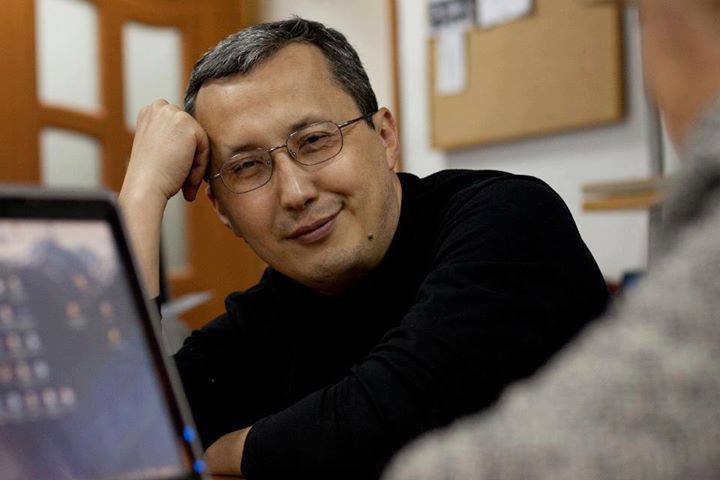Medet Tiulegenov: " AUCA’s uniqueness is its standards of academic honesty"
January 22, 2016
Medet Tiulegenov is an assistant professor of International and Comparative Politics (ICP), as well as serving as the chair of ICP and, as of recently, the Division head of the Politics and International/Area Studies Division. In an interview with Medet Tiulegenov, we find out a little bit about his life and work at AUCA.

Tell us about your background and your career path.
My first degree was in history from the Kyrgyz State University. After working as a junior research fellow for a year in the Academy of Sciences in the field of political science, I went to the US to study Public Administration in Bowling Green State University as a Muskie fellow. Upon coming back, I started to teach at the university, and I also happened to teach, at that time, one course on international conflicts to AUCA’s first graduating class (then the American University of Kyrgyzstan). In 1997, my eleven-year tenure with the Soros Foundation-Kyrgyzstan started. After working in programs related to education, public administration, legal reform, and in various administrative positions, I came back to the academia--where I happily find myself now.
Recently, I have been teaching courses like Public Policy Analysis, Politics of Human Rights, Development Aid and Politics, Intro to Political Economy and other courses which have suited my interests and the needs of the department. In my various courses, whether required or elective, big or small, I prefer to treat teaching as a conversation. Students alongside their professor should be engaged in talking about issues they all find interesting and worth discussing. A good and enlightening conversation is often driven by questions that are posed by the whole classroom, both the instructor and the students. I try to keep this conversation alive at all times, not only in class, but also in the assignments I give the students. The assignments, papers, presentations, etc. provoke the students into repeating those conversations with the issues we discuss in class.
What are you working on right now?
I am trying to bring to fruition my two dissertation projects (at CEU and at a local university) and besides that, I have been engaged in various research projects, some alone, and some in co-authorship or as a part of an international team. One of the international projects is the “Varieties of Democracy” project, which by now has become the biggest database for measuring political regimes and has just been released for public use (check out https://v-dem.net). In that project, I am responsible for Central Asia’s data collection. Quite recently, in conjunction with my departmental colleagues and Sally Cummings (St Andrews University), we published a conceptual article on regime, state and government in Kyrgyzstan. There is one article under review on parliamentarism and one on gender and elections co-written with AUCA colleagues. I also have been doing research on civil society in the political arena, human rights norms, ethnic politics, and on some other issues. One of my current ongoing research projects is on localizing norms in Central Asia, the data for which has been collected with a CASI grant.
Usually an academic life is filled with various conferences, presentations and research trips. The latest lively experience was a trip within a relatively short period of time to Osh, Tashkent, Astana and Almaty which gave me an interesting comparative perspective on an issue on which I was doing research. Many of the conferences entail the discussion of the academic merit of your and your colleague’s work (like doctoral conferences at CEU, conferences of various political studies associations, etc.). Some events are more relevant for exploring the practical concerns of our countries. At these conferences, academics try to engage in discussions with practitioners of current pressing societal needs. There have been plenty of both, and increasingly I find more use in the latter kind of conference.
What is the uniqueness of your department and AUCA’s students in general?
Perhaps there is no need to talk extensively about uniqueness of AUCA in the country, and to some extent in the region as well. I think the hallmarks of AUCA’s uniqueness are its standards of academic honesty and its liberal and creative campus atmosphere. In these respects, AUCA is quite different from many higher educational institutions.
Our department strives to prepare effective citizens of the 21st century. It does not matter whether our graduates hold key decision making positions in politics. Rather, it is important they understand how political society functions and how to work for the benefit of the public good regardless of their future jobs. We try to instill this into all our courses, internships, extracurricular activities and other instances of being a part of our department.
What kind of opportunities do AUCA’s student receive after graduation?
In our department, many students aim, and many quite successfully, for graduate schools in the best intentional universities (just to name few which accepted ICP graduates within last few years – Cambridge University, CEU, Columbia University, St Andrews University, and others). Many graduates prefer to gain practical experience and work in international organizations, NGOs, and businesses. There is a variety of opportunities that a graduating student has, depending on their interests.
